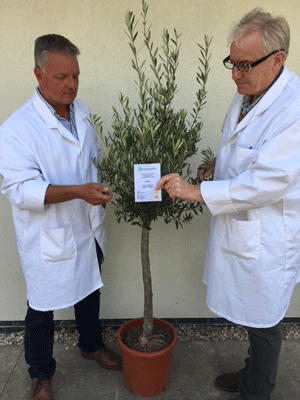Villaggio Verde launches Xylella testing procedures
 With the threat of the potentially devastating bacterial disease Xylella into the UK, growers and horticulturists are advancing testing procedures to help halt the spread.
With the threat of the potentially devastating bacterial disease Xylella into the UK, growers and horticulturists are advancing testing procedures to help halt the spread.
Multi award winning specialist growers and suppliers of olive trees, Villaggio Verde, recently unveiled their pioneering bio security procedures to help tackle the threat. The company started discussions with specialist scientists more than a year ago to explore innovative methods that they could adopt to assure their customers and the industry in general.
A new onsite testing zone has been set up at the company’s nursery in Worcestershire, run by a fully trained technician who takes samples from every single Villaggio Verde olive tree. Using advanced DNA based tests, results are generated in just under an hour. Testing is now in full operation with leaf samples taken from the tree canopy and analysed, providing rigour and reliability. Once tested the tree is issued with a unique certificate, relating to a security tag, showing the olive tree ‘tested negative’.
Villaggio Verde has been working closely with Professor of Plant and Microbial Science, Roy Kennedy, from Pershore College who has helped train all members of the Villaggio Verde staff, showing them how to carry out controlled tests.
Professor Kennedy points out that the threat of Xylella is becoming increasingly significant: “It is incredibly encouraging to see such forward-thinking in biosecurity from a grower and supplier,” he said. “By taking the pioneering step of commissioning us to train a technician on how to use the DNA kit, Villaggio Verde is providing certainty in uncertain times and ensuring that all of their trees have a completely clean bill of health.”
 Jason Hales, owner of Villaggio Verde (pictured left with Professor Kennedy) is passionate about implementing methods to future-proof our environment against external threats: “We feel education is key in biosecurity. We hope that by implementing this testing protocol we will inspire others to adopt the same process, therefore significantly reducing the threat to our shores and our native flora,” he said.
Jason Hales, owner of Villaggio Verde (pictured left with Professor Kennedy) is passionate about implementing methods to future-proof our environment against external threats: “We feel education is key in biosecurity. We hope that by implementing this testing protocol we will inspire others to adopt the same process, therefore significantly reducing the threat to our shores and our native flora,” he said.
The company is totally committed to ensuring that anyone purchasing a Villaggio Verde olive tree can be assured of its health and provenance: “For us, it’s about getting ahead of the curve in biosecurity to help gardeners, landscapers, the environment and our industry,” added Jason.
With more than 350 known plant species susceptible to Xylella, including basics such as lavender and rosemary, Jason points out that it is important to source and buy our plants and trees through trusted reputable suppliers.
Villaggio Verde only recovers olive trees from commercial olive groves in the southern regions of Spain and Portugal where there is no cover crop or vegetation for the spittle bug, the main vector to live. Olive trees are tested in various parts of the grove before the trees re removed, before being containerised and taken to the nursery, where they stand on gravel with no habitat for the vector.
Over three seasons the trees are batch tested regularly by the Spanish Authority before being moved to the UK for further regular inspections and annual testing by DEFRA.
Xylella was first identified more than 100 years ago on grape vines in California and the threat still remains. It has now been added as a threat to UK horticulture as it is already present in mainland Europe.
For more information on Villaggio Verde please visit: www.villaggioverde.co.uk

